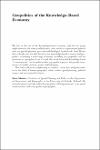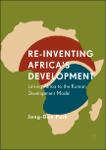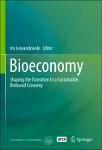Search
Author
- Tetsushi, Sonobe (2)
- Alisher, Mirzabaev (1)
- Almas, Heshmati (1)
- Arkebe, Oqubay (1)
- next >
Subject
- Economics (5)
- Management science (5)
- Development economics (3)
- Economic policy (3)
- next >
Date issued
Has File(s)
- true (16)
Search Results
We live in the era of the knowledge-based economy, and this has major implications for the ways in which states, cities and even supranational political units are spatially planned, governed and developed. In this book, Sami Moisio delves deeply into the links between the knowledge-based economy and geopolitics, examining a wide range of themes, including city geopolitics and the university as a geopolitical site. This book will prove enlightening to students, researchers and policymakers in the fields of human geography, urban studies, spatial planning, political science, and international relations. |
Made in Africa presents the findings of original field research into the design, practice, and varied outcomes of industrial policy in different sectors in Ethiopia. The book explores how and why the outcomes of industrial policy are shaped by particular factors in different industries. The findings are discussed against the backdrop of ‘industrial policy’, which has recently found renewed favour among economists and international organizations, and of the history of thought about and practice in industrialization. The book seeks to learn from the failures and successes in the cement, leather and leather products, and floriculture sectors, all of them functioning under the umbrella of a single industrial strategy. Moreover, it argues that success lies in the interactions among polic... |
Part I: A power and systems approach: Systems thinking changes everything, Power lies at the heart of change, Shifts in social norms often underpin change. Part II: Institutions and the importance of history: How states evolve, The machinery of law, Accountability, political parties, and the media, How the international system shapes change, Transnational corporations as drivers and targets of change. Part III: What activists can (and can’t) do: Citizen activism and civil society, Leaders and leadership, The power of advocacy. Part IV: Pulling it all together: A power and systems approach to making change happen. |
This open access book asks why and how some of the developing countries have “emerged” under a set of similar global conditions, what led individual countries to choose the particular paths that led to their “emergence,” and what challenges confront them. If we are to understand the nature of major risks and uncertainties in the world, we must look squarely at the political and economic dynamics of emerging states, such as China, India, Brazil, Russia, and ASEAN countries. Their rapid economic development has changed the distribution of wealth and power in the world. Yet many of them have middle income status. To global governance issues, they tend to adopt approaches that differ from those of advanced industrialized democracies. At home, rapid economic growth and social changes put... |
A response is needed to the numerous issues spurred by the expansion of the gig economy, where flexible patterns of employment prevail in contrast to permanent jobs. In this context of the exponential growth of the digital economy and underlying business models the largest nationwide study of its kind into the impact of the working conditions in the UK music industry 'Can Music Make You Sick?' has been conducted by MusicTank/University of Westminster. This research suggests the need to consider the future of work not only from an economic or employment law perspective but from a mental health one too. What are the psychological implications of precarious work and how are factors such as financial instability, the feedback economy and personal relationships reflected in mental health... |
This open access book explores the most recent trends in the EU in terms of development, progress, and performance. Ten years after the 2008 economic crisis, and amidst a digital revolution that is intensifying the development race, the European Union, and especially Central and Eastern Europe, are ardently searching for their development priorities. Against this background, by relying on a cross-national perspective, the authors reflect upon the developmental challenges of the moment, such as sustainable development, reducing inequality, ensuring social cohesion, and driving the digital revolution. They particularly focus on the relation between the less-developed Eastern part of the EU and its more developed Western counterpart, and discuss the consequences of this development gap... |
At present, how to develop industries is a burning issue in Africa, where population growth remains high and economic development has thus far failed to provide sufficient jobs for many, especially young people and women. The creation of productive jobs through industrial development ought to be a central issue in steering economic activity across the continent. The authors of this book, consisting of two development economists and five practitioners, argue that the adoption of Kaizen management practices, which originated in Japan and have become widely used by manufacturers in advanced and emerging economies, is decisively the most effective first step for industrial development in Africa. This open access book discusses what Kaizen management is, why it is applicable to Africa, a... |
This book looks at the major policy challenges facing developing Asia and how the region sustains rapid economic growth to reduce multidimensional poverty through socially inclusive and environmentally sustainable measures. Asia is facing many challenges arising from population growth, rapid urbanization, provision of services, climate change and the need to redress declining growth after the global financial crisis. This book examines poverty and related issues and aims to advance the development of new tools and measurement of multidimensional poverty and poverty reduction policy analysis. The book covers a wide range of issues, including determinants and causes of poverty and its changes; consequences and impacts of poverty on human capital formation, growth and consumption; asse... |
This open access book analyses the development problems of sub-Sahara Africa (SSA) from the eyes of a Korean diplomat with knowledge of the economic growth Korea has experienced in recent decades. The author argues that Africa's development challenges are not due to a lack of resources but a lack of management, presenting an alternative to the traditional view that Africa's problems are caused by a lack of leadership. In exploring an approach based on mind-set and nation-building, rather than unity – which tends to promote individual or party interests rather than the broader country or national interests – the author suggests new solutions for SSA's economic growth, inspired by Korea's successful economic growth model much of which is focused on industrialisation. This book will be... |
This book defines the new field of "Bioeconomy" as the sustainable and innovative use of biomass and biological knowledge to provide food, feed, industrial products, bioenergy and ecological services. The chapters highlight the importance of bioeconomy-related concepts in public, scientific, and political discourse. Using an interdisciplinary approach, the authors outline the dimensions of the bioeconomy as a means of achieving sustainability. |










